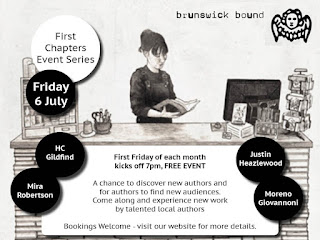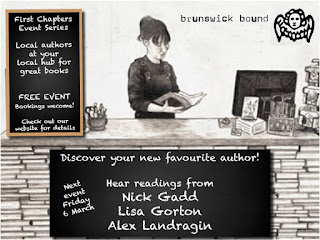First Chapters Q&A with Andrew Brion
Andrew Brion came to writing poetry later in life. Andrew has published in various Melbourne magazines and has also been active in Spoken Word poetry. His writing broadly covers themes exploring our philosophical, emotional and intellectual relationship with the world; themes of travel, and contemporary themes including politics. He grew up in the north of England and now lives in Melbourne.
Andrew will be reading for us at First Chapters on Friday 1 March from his first book of poetry Soul Moves.
We asked him a few questions to get to know him better. Here's what he had to say.
1.
Brunswick Bound has asked you to read a piece from your
published work. Tell us what we can expect from the piece you have
chosen?
I’ll probably read some poems from my book, Soul Moves. I expect to read some poems
on the theme of migration. These would largely reflect the tensions and loves
of the emigrant/immigrant which push and pull between two countries.
2.
How would you describe the kind of poetry that you
write?
I actually write a wide variety of poetry. I think most
poets do. The common themes in my poetry are primarily threefold: existential
ones exploring our philosophical, emotional and intellectual relationship with
the world; travel; and contemporary issues including politics. Most of the
poems in Soul Moves fall into the
first category.
3.
What was the first book that you read (or had read to
you) that left an impression on you?
I genuinely can’t remember that long ago! An old favourite
is certainly The Prophet by Khalil
Gilbran. A book I really loved in slightly more recent times is The Time of Our Singing by Richard
Powers.
4.
Do you believe that books should answer life’s big
questions?
 Not necessarily, though wouldn’t it be nice! I think books
serve a multiplicity of purposes from philosophical ponderings to crazy
entertainment. But I do think they need to take you to a different location,
beyond your everyday experience, into another mind, place or time. To hear
another mind tick, and another storyline unfold.
Not necessarily, though wouldn’t it be nice! I think books
serve a multiplicity of purposes from philosophical ponderings to crazy
entertainment. But I do think they need to take you to a different location,
beyond your everyday experience, into another mind, place or time. To hear
another mind tick, and another storyline unfold.
5.
Do you have any writing quirks?
I do like playing with traditional poetical forms. My favourite
is a sestina though I’ve yet to write a really good one (I have one about
Northcote and another called Childhood
Chills about the scariness of a dark bedroom at night!). Villanelles are
fun too.
6.
What is your favourite word or phrase?
There are some lines of Rumi (in translation) that I love
and, in particular, “Flare up like a flame / and make big shadows I can move
in.” It captures in a sentence that marvellous tension between lightness and
dark in life.
7.
What have you found most surprising about publishing a
book?
I’ve self-published, and I think I was surprised both at how
easy and how difficult it was. Easy in the sense that computers mean that you
can do almost everything yourself these days, without having to buy specialist
software. Difficult in the sense that there are a multiplicity of balls to
juggle. Luckily friends and colleagues are very helpful too – and I’ve been
surprised to find such a helpful community of writers and poets.
8.
What is the question that you hope never to be asked in
an author Q&A?
Probably this one – and I’m guessing that isn’t a very
original response!
9.
What question do you hope you will be asked and why?
I like to be asked about my writing journey. Because I came
to it as an older man never having done much more than write technical reports
and briefings previously: and that it is now almost a way of life for me – but
not in any sense a commercial venture. It’s given me a whole new way of being
in the world and a new dimension in which to express myself.
Writing is about community. About life. About expression. You
don’t need to do it - but you absolutely do!
10. Which
author that you have read do you think should be better known or more widely
read?
In terms of fiction, I’m always amazed how few people know
of Richard Powers. Particularly in Australia.
If we’re talking poetry I reckon there are surprisingly few
uniformly good poets, perhaps because it is such a demanding discipline and
there are so many poems. And I’m poorly read though trying to catch up! But I
recently read Earth Hour by David
Malouf – who knew what a tremendous poet he is?
You can find out more about First Chapters on the Brunswick Bound website.




Comments
Post a Comment